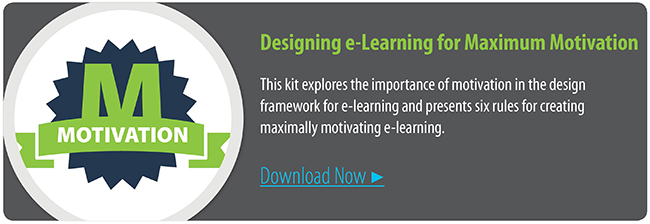Blog
Six Achievable & Effective Techniques to Enhance Learner Motivation
Ethan Edwards | chief instructional strategist


Motivational e-Learning: It Takes More Than Treats
By Ethan Edwards | October 30, 2013 | Custom Learning | 0 Comments

Ethan Edwards | chief instructional strategist
I hate Halloween.
No, perhaps that’s too strong.
I dislike Halloween.
You know, that’s probably too strong too.
I find Halloween utterly uninteresting.
There. That captures it. It just bores me to distraction. And the more it becomes a big deal to the world in general, the less I am inclined to pay any attention to it.
I realize I have a non-standard perspective, at least to judge by the number of decorated houses and bins of candy and quantities of plastic junk that are everywhere. I can trace this disinterest to my childhood. Halloween in the late 60s was celebrated nothing like it is today, but even then it was supposed to be a pretty big deal—costumes, candy, party, etc.
Unfortunately, all the elements meant nothing to me. I don’t much care for candy…particularly gum, Tootsie Rolls, circus peanuts, and candy corn which are what was always handed out in our neighborhood. Even when a neighbor would splurge on candy bars to distribute, it was my brother who would inevitably score a much-desired Snickers and I’d be stuck with something inedible like a Bit-O-Honey.

The costumes were worse. I was the youngest of 5 kids in a family of limited means, which meant I never had a costume that hadn’t already been worn at least 4 times. In fact, most of my costumes had been worn more like ten times since they had already been cast off by my older cousins, also a family of 5. I couldn’t get excited about dressing as a cartoon character who I didn’t even recognize and who had not been on TV since before I was born (it was some sort of bear, but I never know who exactly).
My Dad was a stickler for the “Trick” part of Trick-or-Treat and insisted that we do a trick at each door before we could take any candy, so we had to suffer the embarrassment of telling jokes or singing or something equally stupid. Looking back, I’m not sure why we felt compelled to do it because Dad was not there and surely would never have known had we shirked that duty.
So why am I airing this grievance now? (Honestly, I’m not bitter!) It’s because it tells us something important about enlisting participation in activities, even those that in our own minds need no assistance. The truth is, motivation is at the root of nearly everything we do successfully. There’s nothing wrong with Halloween, but it was never presented to me in a way that connected with anything I cared about. Telling me that I should like getting candy and that dressing up will be fun, when I knew otherwise, did not motivate me in the slightest. I had no choice but to play along, but I was sure there was really nothing in it for me that I valued and each year I got just a little bit less interested. Admittedly, there was one thing that I did love about Halloween: glazed donuts and fresh apple cider for treats at the Grange meeting closest to the Halloween. If only someone would have understood my perspective enough to highlight that, my overall experience with the holiday would have been entirely different.
I find that there is a striking parallel between my Halloween experience and how users are encouraged to do e-learning. We serve up objectives that have no personal significance to the learners and yet we expect them to buy into them. We create “characters” or “games” that we declare to be fun, ignoring the fact that often we are just creating elements that may have no value to the learners and instead create obstacles for the learner to get to completion. We offer points or vicarious money as reward for answering questions when those rewards transfer to nothing that the user actually values.
Next time when you think are thinking about crafting your e-learning to engage your learners, really try to put yourself in their shoes and think about what things will actually improve their motivation, instead of burying them in what has failed before. Get them acting as soon as you can by lecturing less. Make the challenges something they care about and are intrigued by. Trust them to think on their own by delaying judgment. Use feedback as a welcome place to provide information that the learner has shown then need rather than deciding for them before they even have a chance to prove their knowledge. And create graduated challenges that the learner has some control over. E-learning built with these principles tends to build connections that last.
For more information about these design ideas that enhance motivation in e-learning download this white paper.

About the Author: Ethan Edwards
Ethan Edwards draws from more than 30 years of industry experience as an elearning instructional designer and developer. He is responsible for the delivery of the internal and external training and communications that reflect Allen Interactions’ unique perspective on creating Meaningful, Memorable, and Motivational learning solutions backed by the best instructional design and latest technologies.
Comments
Would you like to leave a comment?
Related Blog Posts

By: Ethan Edwards | Nov, 2016
Category: Custom Learning

Blog
No More Slimy e-Learning
Ethan Edwards | chief instructional strategist
By: Ethan Edwards | Oct, 2013
Category: Custom Learning

Blog
e-Learning...as Easy as Pie
Ethan Edwards | chief instructional strategist
By: Ethan Edwards | Nov, 2012
Category: Custom Learning


